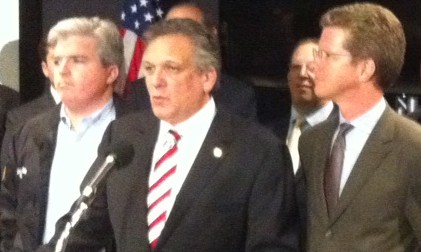

The Long Island Power Authority faces intense scrutiny of its response to Superstorm Sandy.
Two days after Mike Hervey announced his resignation as head of the Long Island Power Authority the Daily News lampooned him in a cartoon on their op-ed page, putting him in a dark suit, wires wrapped around his head, and leaving a tangled trail of utility poles behind him.
That same Thursday, seated in a conference room at National Grid’s Hicksville headquarters, Hervey was jovial in a zippered green fleece, without a tie, and without a suit. For a man who hadn’t gotten much sleep in the past two weeks, the 54-year-old electrical engineer looked relaxed, perhaps because making his resignation official—something LIPA trustees told the Press had been in the works for months—was a relief.
Gov. Andrew Cuomo, whose father Mario had helped create LIPA in 1989 after the Shoreham Nuclear Power Plant decommissioning saddled the Long Island Lighting Company with billions of dollars in debt, made Hervey a target for blistering criticism.
Hervey took it in stride.
“I’ve never met the governor,” he says, calmly.
Two years ago, the then-LIPA chief operating officer who’d been there a decade, had the support of the LIPA board of trustees to become the next chief executive officer. But he did not have the governor’s backing. LIPA couldn’t appoint Hervey without state Senate confirmation, and so he became the interim CEO.
In August, Hervey says, “It became obvious to even me that I wasn’t going to be selected for that spot.”

Outgoing LIPA chief Michael Hervey assesses some of Hurricane Sandy’s devastation with a crew member shortly after the superstorm tore through Long Island and knocked out power to more than 1 million customers. (Rashed Mian/Long Island Press)
Previous CEOs have included Richie Kessel, famous for stopping Shoreham, and Kevin Law, a former Suffolk County deputy supervisor and now head of the Long Island Association, the business lobbying group which recently hosted Vice President Dick Cheney.
“I tried to be as apolitical as possible, which was a shift from the past,” says Hervey. His attitude may have cost him, but now that the spotlight is pointing at Cuomo it no longer matters.
“The governor’s been very critical of LIPA as far as its preparations go, but when you think about it, he has neglected the agency for three years,” says Matt Cordaro, a utility executive with four decades of experience (22 years at LILCO alone) who co-chairs the Suffolk County Legislature’s LIPA oversight committee.
Besides the CEO vacancy, Cuomo still has to appoint a new board chairman to replace Howard Steinberg, whose term expired months ago, and fill the seven trustee openings, rendering the 15-member board at half strength during the most critical period in its history.
Cordaro scoffed at Cuomo’s recent announcement that he’ll invoke the Moreland Commission, which has subpoena powers but can’t prosecute or punish, to examine how LIPA, Consolidated Edison and other New York public utilities have dealt with Tropical Storm Irene last year and Superstorm Sandy this fall. One of its members will be Nassau County District Attorney Kathleen Rice.
This commission will join an investigation by state Attorney General Eric Schneiderman, an audit by Comptroller Tom DiNapoli, a state Senate investigation by Sen. Carl Marcellino (R-Syosset) as well as other studies—the governor still hasn’t released the inspector general report completed months ago—and a proposal by Assemb. Charles Lavine (D-Glen Cove) to establish a LIPA ratepayers’ bill of rights.
“They just drag things out,” says Cordaro, “It’s the old political ploy of kicking the can down the road.”
The governor declined to comment for this story, despite repeated calls to his press office.
Hervey was used to being a lightning rod for criticism, not so the unpaid LIPA Board of Trustees, who got no credit for their thankless work to fix LIPA—from choosing New Jersey’s PSEG utility to replace the UK-based National Grid in 2014 to changing from fossil fuels to renewable energy sources as well as speeding up the implementation of a new communications system that will finally replace the decades-old COBOL computer language that LIPA was contractually forced to rely on at its substations. All their efforts—that won’t bear fruit for another year at least—seemed to come crashing down Oct 29, along with countless venerable old oak trees knocked over by Sandy’s fury.
For John Bruckner, National Grid’s top executive in charge of electric transmission and distribution on Long Island, it was his “Douglas MacArthur moment,” says one local union official at Nat Grid with admiration. Tellingly, Bruckner just got a promotion to head the company’s U.S. operations.
After Sandy left 90 percent of LIPA’s 1.1 million customers without power, some 14,000 workers came from 45 states and Canada to help out.
“The crews who restored power in my neighborhood were from Wisconsin,” Hervey says.
As more crews came to help, Hervey tells the Press, “the management string” got stretched pretty thin. In almost every neighborhood across the Island, residents watched tree crews that came and went—if they showed up at all—while they waited for the line crews to get the juice flowing again. Information was always in short supply. The workers only knew their next assignment. The LIPA website, when it was up, repeated the annoying mantra that they were “assessing the situation.”
“I was infuriated by the lack of information,” says Neal Lewis, one of the LIPA trustees. “We all went through the same things that all Long Islanders went through.” [Except the recriminations, the investigations and the accusations, of course.]
As for Melville attorney Kenneth Mollins’ class-action lawsuit, filed Nov. 13 in State Supreme Court on behalf of the ratepayers for “well into the multi-millions of dollars,” as the attorney said at a press conference, Lewis would only comment that, in the unlikely event the suit won, “it would just be money from Long Island ratepayers to a bunch of lawyers.”
Hervey says what LIPA just did was “probably the largest magnitude restoration that any East Coast utility has ever done—and we got to an end point, but we didn’t get to the end point unscathed for either me personally or us as the utility, and we have things to work on.”
He says he leaves LIPA feeling “very good” about the changes he’s initiated but “very sad about the customers who had to wait so long.” Hervey tells the Press he’ll soon be announcing his new gig, which he declined to name except that it’s within the power industry.
At home in the cold and dark, LIPA’s top executive had a “little Coleman generator that essentially died the second day. But,” he grinned, “I had a nice flashlight.”






